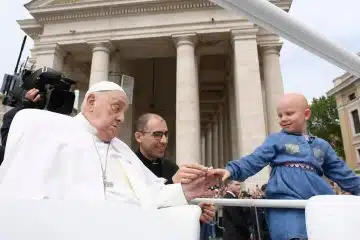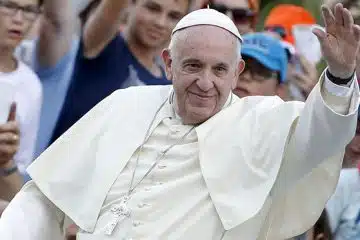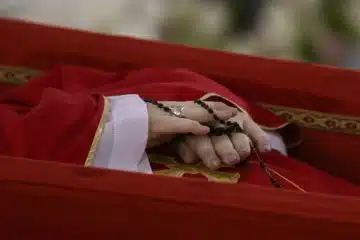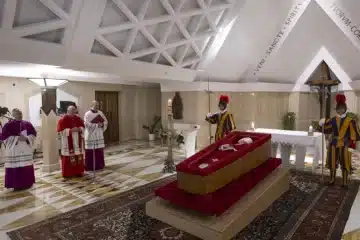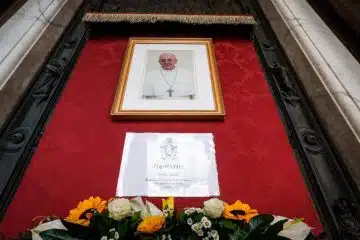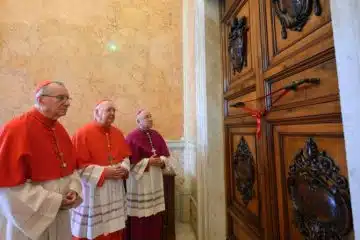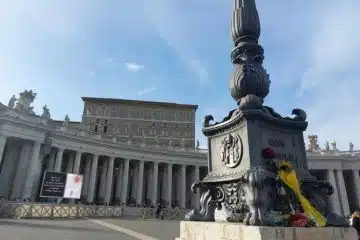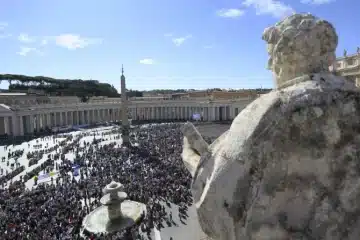Pavone: With transfer pending, campaign work a matter of ‘conscience’
by Matt Hadro
Washington D.C., Apr 21, 2020 / 11:25 am MT (CNA).- Fr. Frank Pavone, national director of Priests for Life, says he will serve in leadership positions in the 2020 campaign to reelect President Donald Trump. While the priest told CNA that concerns about his political and ecclesiastical activity have been resolved, his home diocese has not clarified numerous questions about Pavone’s status in the Church.
An outspoken supporter of the president, Pavone serves as co-chair of the Trump 2020 campaign’s pro-life coalition, and a member of the “Catholics for Trump” advisory board. At an April 2 online launch, Pavone said the group would aim to tell Catholic voters how the Trump administration is putting the Church’s social teaching into practice.
“This coalition is going to be truly a movement where Catholics rise up and say, ‘Hey look, everything that the Church has been saying, we’re seeing it unfold before our eyes, not like magic, but with strong effort and united effort under this president’,” Pavone said during the online event.
Ordained a priest by Cardinal John O’Connor of New York in 1988, Pavone has served in pro-life leadership positions full-time since 1993. In addition to being national director of Priests for Life, he is national pastoral director of ministries serving post-abortive mothers, Silent No More and Rachel’s Vineyard. He has also served on the Pontifical Academy for Life and the Pontifical Council for the Family.
In 2005, the priest transferred to the Diocese of Amarillo, with plans to begin a pro-life religious order of priests. Those plans did not materialize, and Pavone found himself at odds with Bishop Patrick Zurek, soon after the bishop was installed in 2008.
In 2011, the dispute between Pavone and Zurek became public, after the priest was recalled to the diocese and suspended by the bishop. Pavone appealed to the Vatican, and the suspension was eventually lifted in 2012.
Pavone’s role in partisan politics is unusual for a priest. Members of the clergy require permission to “have an active part in political parties,” according to the Church’s canon law.
Speaking to CNA on April 17, Pavone was asked whether he had the permission of his bishop for campaign activity. The priest declined to answer directly. Instead, he suggested he did not need such permission because, he said, his focus on opposing abortion.
“Right now, all the advice I have been given is that, from the perspective of permissions and so forth, all the advice I have been given is not ‘Oh no, don’t do this,’” the priest told CNA.
Pavone added that he thinks engaging with his bishop is “a dysfunctional process,” and that “you can’t very well ask or receive anything, because there’s no relationship, there’s no communication.”
“It just hasn’t been workable to even ask a clear question or get a clear answer,” Pavone claimed.
Still, Pavone said that from his view, his campaign activity is a matter of conscience, regardless of canonical norms concerning permission from his bishop.
“It’s like, ‘Hey the house is on fire!’ I’m not going to ask anybody’s permission to go scream that the house is on fire…that’s the distinction that I would make,” the priest told CNA.
Speaking with CNA April 20, Pavone’s canon lawyer, Fr. David Deibel, disputed the notion that Fr. Pavone was engaging in partisan politics.
“I would take issue with the word ‘political activity,’ the phrase,” Deibel said. “Affirming the Church’s teaching” on faith and morals “comes with the ordination to priesthood, and the ordination to diaconate, and of course is ultimately supervised in a particular church by a bishop,” he said.
Pavone’s talking about abortion and politics “is not political activity,” he added.
On Monday afternoon, before he spoke with CNA, Pavone tweeted that “In Jan, @realDonaldTrump was taking aggressive action re #coronavirus”
“What were #Democrats doing?” he asked. “Sham #impeachment proceedings.”
“#Pelosi and her crowd are unfit to govern. #Vote them out!” he tweeted.
The USCCB’s statement on political life, “Forming Consciences for Faithful Citizenship,” explains that in the discharge of their duties, “the Church’s leaders avoid endorsing or opposing candidates.” Asked about that statement, Pavone told CNA he believes his focus is on issues.
The Diocese of Amarillo did not respond to repeated requests from CNA for clarity about Pavone’s political activity or ecclesiastical status, including requests to clarify whether he has faculties to minister publicly as a priest.
Pavone told CNA that he is in the process of “transferring” from the Diocese of Amarillo, where he has been incardinated since 2005, to a new diocese, adding that he considers himself to be already under the authority of a different bishop.
“The new bishop, to whom I’ve been transferred, is the one whose authority I am under right now,” he said, describing himself as a “priest in good standing,” which he told CNA means that he is not subject to any canonical penalties or prohibitions.
The Priests for Life website says that “By a decree of the Vatican dated November 11, 2019 (Congregation for the Clergy, Prot. N. 2019 4532), [Pavone] was transferred out of the Diocese of Amarillo and granted the opportunity to continue to carry out his pro-life work under a new and supportive bishop.”
Pavone said he is not at liberty to name the diocese or bishop under whose authority he will operate in future, saying only that his political advocacy is well-known, and unopposed.
“They know—‘they’ being the old bishop, the new bishop, the Vatican—they all know,” he said.
Pavone said his transfer follows a series of appeals to Rome’s Congregation for the Clergy, and it will be for his new bishop to consider his situation. Pavone told CNA that his work does not fit neatly into the Church’s existing structures, which is part of the reason he has had difficulty with bishops.
Nevertheless, the priest told CNA his new bishop will review his affiliation with the Trump campaign, which he described as “help with the campaign’s outreach to pro-lifers and Catholics.”
It “is something that, as we transition under another authority, that authority looks at and gives guidance,” Pavone told CNA.
Pavone told CNA that in 2016, he sought a transfer to the Diocese of Colorado Springs. Asked whether his pending transfer is to Colorado Springs, Pavone declined to confirm or deny it.
The “new bishop is going to announce that himself. I don’t want to get ahead of that announcement, because he has to talk to his priests first, and then he’ll make an announcement about that,” Pavone said.
“I’m just waiting for him to say it first,” the priest added.
The Diocese of Colorado Springs told CNA that Bishop Michael Sheridan has not received information from the Congregation for the Clergy to indicate that Pavone is being transferred to Colorado.
Pavone is “not under the authority of Bishop Sheridan,” the Colorado Springs diocese told CNA, and the priest “does not have priestly faculties in the Diocese of Colorado Springs.”
As he prepares for his apparent transfer, CNA asked Pavone about a controversy from the 2016 election.
Ahead of the election, during which Pavone also served as co-chair of Trump’s pro-life coalition, the priest filmed a video at the Priests for Life headquarters, urging support for Trump. The video was staged with the body of an aborted baby laid before Pavone on what appeared to be an altar.
Bishop Patrick Zurek of Amarillo said soon after the video’s release that he would open an investigation into the incident, calling it “against the dignity of human life” and “a desecration of the altar,” and adding that “the action and presentation of Father Pavone in this video is not consistent with the beliefs of the Catholic Church.”
Pavone told CNA on Friday that “nothing happened” after the incident, and the Amarillo diocese has not responded to questions about its investigation or its outcome.
“He [Zurek] told me the narrative that he thought happened. I pointed out he was assuming things and jumping to conclusions and failing to ask me any questions,” Pavone said, “which is an interesting way to conduct an investigation. And that was it. There was nothing.”
Of the incident, Pavone told CNA that: “I had done similar things in the past with no complaint.” In 2013 and in 2011, Pavone conducted open-casket funerals of babies killed by abortion.
Asked whether he regrets the use of an aborted baby in the 2016 video, Pavone told CNA that “the showing of the babies is absolutely essential” and added that he did not use a consecrated altar, but a table that was sometimes used to offer Mass.
The priest said he could have worked to ensure that the table did not look like an altar. In the video, candles and a liturgical book sit atop the table, which is covered by a cloth.
“The altar was not part of my message,” he claimed, adding that he is “liturgically sensitive” enough to know not to use a consecrated altar for that purpose. Pavone also emphasized that the video was not technically filmed in a chapel–the group never requested permission to dedicate a space as a chapel–but in a multi-use room used for Mass, among other things.
According to Pavone, Bishop Zurek requested a letter from him clarifying the details of the incident. He said he sent the letter to the bishop who, he said, did not acknowledge it.
Pavone also disputed that the presence of the body of an unborn baby would “desecrate” an altar.
“That just shows people’s—their crappy view of the unborn, when you come right down to it, when they think that a baby’s body desecrates,” he said. “A baby’s body is holy, and we honored that body, we honored that body that day and we honored the body with burial.”
“But I did say in the letter, would I do it again? Absolutely. But you don’t put it on an altar,” he said. “The point is, you show the public the baby.”
“We honored this baby. It was the abortion industry that dishonored the dignity of that child. We honored that baby with proper burial, and honored that baby by letting that baby be seen by the world.”
While Zurek has criticized Pavone, he has also spoken in opposition to abortion and in support of efforts to defend the unborn.
“A right to do something evil simply cannot be a right all. Never! That simply defies logic,” Zurek said in February 2019 in reference to abortion.
“The blood of our innocents is crying to us for help. Now is the time to rise up! We need much prayer and actual witness and manifestation, and most concretely to constantly be a people who promote life,” the bishop added.
For his part, Pavone said his situation is about more than himself.
“It’s not about canon law. It’s not about bishops and decrees and suspensions that were later declared invalid, or the authority of bishops over priests,” he said. “This is about the Church. I am not the one on trial. It is the Church, and the response that we’re going to make or not make about abortion.”
“There are some in the Church who—they’re radically opposed to what a lot of us in the pro-life movement do. And ultimately, a lot of it is rooted in what we were just talking about…political alliances, political affiliations, and this leads to efforts to silence the people who are calling out these problems,” the priest said.
Shortly after he was asked by CNA on Friday about canonical permission for his political work, Pavone tweeted that “the modern day Pharisees are here. Canon 287: Clerics are not to have an active part in political parties. The #Catholic #Church can be fined and shut down by #Democrat mandates, & all you want is that priests keep their mouths shut? Over my dead body, you hypocrites.”
Pavone told CNA that his support for the Trump campaign is an advisory role, with the goal of furthering pro-life policies.
The priest added that his partisan advocacy is justified by the gravity of the situation facing the Church in the U.S., and that Catholic organizations face threats of heavy fines for resistance to objectionable government mandates— citing the example of the HHS contraceptive mandate.
Pavone’s take on the stakes of the 2020 election is stark.
“Anybody who doesn’t see that the survival of church activity and the survival of America—not to mention the tens of millions of lives of children—depends on re-electing the president, they’ve got a problem,” he said.
Priests for Life was the subject of a Vatican investigation after Bishop Zurek of Amarillo recalled Pavone to the diocese from New York in 2011, citing “deep concerns regarding his stewardship of the finances of the Priests for Life (PFL) organization.”
At the time, Priests for Life was running a $1.4 million deficit, and Zurek said that persistent questions had been raised about the way donations were handled. He charged that Pavone was disobedient and had refused to allow Priests for Life to be audited.
Zurek announced in a Sept. 9 letter to his fellow bishops that he had suspended Fr. Pavone from public ministry outside the diocese, beginning Sept. 13, 2011.
Pavone appealed the suspension to the Vatican.
Pavone told CNA that the organization provided the diocese “full and complete annual audits” yearly, and that independent audits of the organization were conducted between 2005 and 2010 but the diocese never acknowledged receipt.
According to Pavone, in 2011 Bishop Zurek invited him to his office for a meeting, but that on the advice of his canon lawyer he refused to attend and asked instead for mediation.
In 2012, Fr. Pavone said his suspension had been lifted by the Vatican, and an apostolic visitation of Priests for Life was conducted in 2013.
In 2014, Cardinal Timothy Dolan of New York wrote a letter to fellow bishops disavowing Priests for Life. claiming that he tried to work with Priests for Life to enact Vatican-mandated reforms of the group, but that Fr. Pavone refused to permit a forensic audit or allow the appointment of an independent board.
Pavone claims that “there were no reforms that were required of us,” adding that the Vatican made “suggestions” to the group after its visitation but that “none of these are obligatory.”
Although Pavone told CNA that he is “a priest in good standing,” the website of Priests for Life does not list a current letter of good standing, or an enumeration of his faculties.
One page, headed “Fr. Frank Pavone is a priest in good standing,” contains links to several documents, the most recent of which was issued in 1988 for the Archdiocese of New York, where Pavone is no longer incardinated.
When asked by CNA where he has priestly faculties, Pavone answered that he was “in transition” and said that he has the support of the Vatican for his priestly work. Deibel clarified that “the particulars of the transition are not public and are not suitable for publication at this point.”
Pavone has the freedom to celebrate private Masses, for himself and “any congregation that happens to be with Priests for Life,” Deibel said.
“Yes, Fr. Frank remains incardinated in the Diocese of Amarillo. Period. Yes, a transition is in process. Period. That transition was authorized through a process that was concluded in Rome. Period,” Fr. Deibel said.
Ed. note: Subsequent to the publication of this story, CNA recieved by email the following statement from Fr. Pavone:
“The Congregation for Clergy, after a thorough investigation, has declared that I am a priest in good standing.
Whoever denies this, in any manner and in any forum, will be called to respond before the competent civil and canonical authorities.
The unjust and prolonged accusations against me were rejected by the Congregation for the Clergy both for their abuse of process law and for the lack of merits in canonical discernment.
I continue my priestly life and pro-life apostolate following the directives of the Magisterium of the Catholic Church, in communion with the Ecclesiastical authorities.”


